Save Money, Save Yourself

Sylvia and her husband, Joe, were a suburban couple who seemed to have it all. They had four beautiful children, lived in a large five-bedroom home, wore the latest clothes and took luxurious vacations. "I wanted a big house; I wanted a big family. I wanted to live comfortably," Sylvia says.
Their home was filled with exotic collectibles. "My husband started the house-decorating," she says. "Every single part of the wall had to be covered. It didn't matter how much it cost. He never looked at prices."
The playroom overflowed with toys, and everyone's closets were jammed with clothes. "If they wanted to get something, if I didn't have enough money, I put it on a credit card," she says. "If you looked through my closet, I have things with tags on it I haven't even worn yet. It didn't matter if I had 10 pairs of jeans, I'd still buy a pair of jeans cause it fit good."
Sylvia says she never thought her family would have money problems…until Joe's spending spiraled out of control. Instead of paying the mortgage, Sylvia says Joe bought a motorcycle. "He just was reckless spending," she says. Eventually, Sylvia lost track of Joe's bills. "He starting taking the mail away so I couldn't see what he was spending on," she says. "I was very scared. I was afraid that we wouldn't be able to pay the mortgage."
Sylvia never imagined she would lose more than her home. After returning from a weekend away with the kids, she discovered her husband had killed himself in their garage. The next day, a stunned Sylvia learned Joe had canceled his $300,000 life insurance policy three months before. He had also stopped making all mortgage payments.
Sylvia had only $72 in her checking account. With no savings accounts or retirement plans to fall back on, Sylvia faces $450,000 in mortgage debt, $17,000 in her own credit card debt and another $40,000–50,000 owed on Joe's credit cards.
Their home was filled with exotic collectibles. "My husband started the house-decorating," she says. "Every single part of the wall had to be covered. It didn't matter how much it cost. He never looked at prices."
The playroom overflowed with toys, and everyone's closets were jammed with clothes. "If they wanted to get something, if I didn't have enough money, I put it on a credit card," she says. "If you looked through my closet, I have things with tags on it I haven't even worn yet. It didn't matter if I had 10 pairs of jeans, I'd still buy a pair of jeans cause it fit good."
Sylvia says she never thought her family would have money problems…until Joe's spending spiraled out of control. Instead of paying the mortgage, Sylvia says Joe bought a motorcycle. "He just was reckless spending," she says. Eventually, Sylvia lost track of Joe's bills. "He starting taking the mail away so I couldn't see what he was spending on," she says. "I was very scared. I was afraid that we wouldn't be able to pay the mortgage."
Sylvia never imagined she would lose more than her home. After returning from a weekend away with the kids, she discovered her husband had killed himself in their garage. The next day, a stunned Sylvia learned Joe had canceled his $300,000 life insurance policy three months before. He had also stopped making all mortgage payments.
Sylvia had only $72 in her checking account. With no savings accounts or retirement plans to fall back on, Sylvia faces $450,000 in mortgage debt, $17,000 in her own credit card debt and another $40,000–50,000 owed on Joe's credit cards.
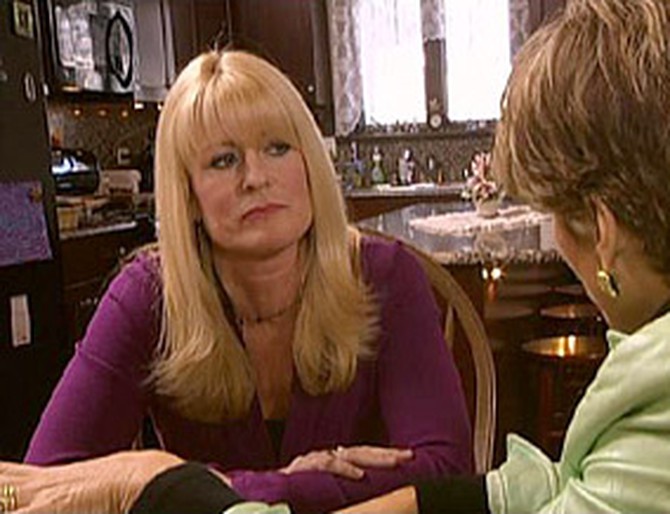
Financial expert Suze Orman says women across America are committing financial suicide by not paying attention to money. When she meets with Sylvia to help her through her financial crisis, she quickly learns Sylvia's money problems are a symptom of a deeper issue. "It was a very controlling kind of relationship," Sylvia says. "A lot had to do with money, too. He didn't trust anybody with his money. If we went anywhere together, I had to dress sexy. He wanted me to do everything his way, and I let it happen."
Sylvia says Joe used to tell her she was worthless and was physically aggressive with her. Suze says she suspected Sylvia was in an abusive situation even before they met. "Money will always show what's really going on. How somebody treats their money is just another manifestation of how they treat the people around them. He was abusive to his money," Suze says. "And there's nobody that would cancel an insurance policy three months before they commit suicide without it being a major act of abuse."
Suze helps Sylvia realize that she didn't take his money from him—and that he robbed Sylvia of herself. Sylvia says she tried to leave Joe before, but money always brought her back. "I was afraid, and I felt like I was stuck because he said I couldn't make it without him. I couldn't make it without his money," Sylvia says. "I would always go back because of it."
Suze says women in Sylvia's situation can learn from her mistakes. One of the biggest mistakes women make is staying in an abusive relationship because they don't have the money to leave. The other, Suze says, is trusting that that person will protect you. "Joe owned the insurance policy, was responsible for making payments on it, an insurance policy that would have protected you. You just trusted that of course he was going to protect you," Suze says. "And that was her security blanket. But it was a false security blanket. There was no power there. That was a powerless situation that you had put yourself into."
Sylvia says Joe used to tell her she was worthless and was physically aggressive with her. Suze says she suspected Sylvia was in an abusive situation even before they met. "Money will always show what's really going on. How somebody treats their money is just another manifestation of how they treat the people around them. He was abusive to his money," Suze says. "And there's nobody that would cancel an insurance policy three months before they commit suicide without it being a major act of abuse."
Suze helps Sylvia realize that she didn't take his money from him—and that he robbed Sylvia of herself. Sylvia says she tried to leave Joe before, but money always brought her back. "I was afraid, and I felt like I was stuck because he said I couldn't make it without him. I couldn't make it without his money," Sylvia says. "I would always go back because of it."
Suze says women in Sylvia's situation can learn from her mistakes. One of the biggest mistakes women make is staying in an abusive relationship because they don't have the money to leave. The other, Suze says, is trusting that that person will protect you. "Joe owned the insurance policy, was responsible for making payments on it, an insurance policy that would have protected you. You just trusted that of course he was going to protect you," Suze says. "And that was her security blanket. But it was a false security blanket. There was no power there. That was a powerless situation that you had put yourself into."
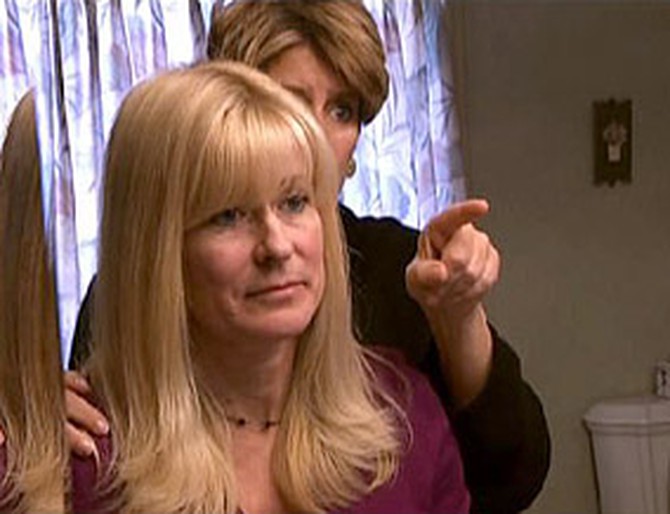
It's now time for Sylvia to start living her truth, and Suze pushes Sylvia to be honest with herself. "You found your husband dead. He committed suicide. I get that was probably incredibly traumatic to see those things," Suze says. "On any level was it a relief?"
Sylvia admits that it was—and says that finally admitting that feels good. "I always would try to cover up with makeup because I try to hide what's inside, and I've always been like that since I've been with him," Sylvia says.
For 18 years, Sylvia says she only took off her makeup right before bed and put it on first thing in the morning because her husband always wanted her to look good. When Suze asks her what she would change most about herself, it isn't her appearance. "Confidence," Sylvia says.
Suze decides it's time to see the real Sylvia—and take off the makeup. "We're gonna get down to the bare-naked truth about money," Suze says. "You have to sometimes just take it off. Because, you see, unless you love who you are without any facade, how are we gonna do anything?"
Together, Suze and Sylvia remove their makeup. After nearly two decades of looking good—and feeling nothing but pain—Sylvia faces her true self. "From this day forward, we don't care what you look like. We care what you feel like first," Suze says. "I think you're prettier without makeup. … You look like who God made you to be."
Sylvia has a hard time looking at herself in the mirror. "I see empty inside," she says. "That's why I don't like to look at myself."
"But you want to know something? You're not empty inside," Suze says. "You have a heart, you have a soul, and you have courage to go on. You're not empty inside. You are incredible."
Sylvia admits that it was—and says that finally admitting that feels good. "I always would try to cover up with makeup because I try to hide what's inside, and I've always been like that since I've been with him," Sylvia says.
For 18 years, Sylvia says she only took off her makeup right before bed and put it on first thing in the morning because her husband always wanted her to look good. When Suze asks her what she would change most about herself, it isn't her appearance. "Confidence," Sylvia says.
Suze decides it's time to see the real Sylvia—and take off the makeup. "We're gonna get down to the bare-naked truth about money," Suze says. "You have to sometimes just take it off. Because, you see, unless you love who you are without any facade, how are we gonna do anything?"
Together, Suze and Sylvia remove their makeup. After nearly two decades of looking good—and feeling nothing but pain—Sylvia faces her true self. "From this day forward, we don't care what you look like. We care what you feel like first," Suze says. "I think you're prettier without makeup. … You look like who God made you to be."
Sylvia has a hard time looking at herself in the mirror. "I see empty inside," she says. "That's why I don't like to look at myself."
"But you want to know something? You're not empty inside," Suze says. "You have a heart, you have a soul, and you have courage to go on. You're not empty inside. You are incredible."

With the makeup off, Suze helps Sylvia realize the full extent of her financial problems. Sylvia used to work as a hairdresser but hasn't had a job in 12 years. With Sylvia already behind on her mortgage payments, Suze breaks down all of her bills.
Just to maintain the house for her four children—including the mortgage, home equity lines of credit, property taxes, insurance and the telephone bill—Suze says Sylvia owes $4,698 per month. Although her two cars are paid off, Sylvia still pays about $355 per month for gasoline, maintenance and licensing fees, plus $312 per month for car insurance. "But currently, we have no health insurance for you, no life insurance for you, no disability insurance for you, no dental insurance for you," Suze says. "We've protected the cars but haven't protected you."
On top of keeping a roof over their heads, daily expenses to care for her children tally up to about $1,839 per month. And if she makes only the minimum payments on her credit cards, she will pay about $1,754 each month. In total, Sylvia's bills add up to a whopping $9,248 per month.
Suze says most women underestimate what it really costs to live day-to-day. "You think it costs you to live the amount of your paycheck," she says. "The truth of the matter is, if you add everything in, it's probably $1,500 to $3,000 more per month than it's really costing you, which is why you never get out of credit card debt. You never have money to save. You never feel like you can get ahead."
Like Sylvia, Suze says every woman needs a reality check. "Look at the things that you spend on vacation. On gifts for the holiday, birthday, wedding gifts. The little potlucks that you do, whatever it is," Suze says. "Take those major expenses that maybe you just do once a year, divide that by 12, and then add that to your monthly expenses. You'll get a real picture of what's going on."
Sylvia's new reality is that she needs to start from scratch. Suze says Sylvia needs to sell her home and rent a one-bedroom apartment—but not only for financial reasons. "The children are used to sleeping with mommy—all four of these children—to protect Mommy at night from Daddy. … And even though Daddy is not here now, they still sleep with Mommy altogether because that's the only way they feel safe," Suze says. "A one-bedroom apartment is what fits this situation because they don't want to sleep apart yet … they're not emotionally capable of separating right now because of everything they've seen as well."
Just to maintain the house for her four children—including the mortgage, home equity lines of credit, property taxes, insurance and the telephone bill—Suze says Sylvia owes $4,698 per month. Although her two cars are paid off, Sylvia still pays about $355 per month for gasoline, maintenance and licensing fees, plus $312 per month for car insurance. "But currently, we have no health insurance for you, no life insurance for you, no disability insurance for you, no dental insurance for you," Suze says. "We've protected the cars but haven't protected you."
On top of keeping a roof over their heads, daily expenses to care for her children tally up to about $1,839 per month. And if she makes only the minimum payments on her credit cards, she will pay about $1,754 each month. In total, Sylvia's bills add up to a whopping $9,248 per month.
Suze says most women underestimate what it really costs to live day-to-day. "You think it costs you to live the amount of your paycheck," she says. "The truth of the matter is, if you add everything in, it's probably $1,500 to $3,000 more per month than it's really costing you, which is why you never get out of credit card debt. You never have money to save. You never feel like you can get ahead."
Like Sylvia, Suze says every woman needs a reality check. "Look at the things that you spend on vacation. On gifts for the holiday, birthday, wedding gifts. The little potlucks that you do, whatever it is," Suze says. "Take those major expenses that maybe you just do once a year, divide that by 12, and then add that to your monthly expenses. You'll get a real picture of what's going on."
Sylvia's new reality is that she needs to start from scratch. Suze says Sylvia needs to sell her home and rent a one-bedroom apartment—but not only for financial reasons. "The children are used to sleeping with mommy—all four of these children—to protect Mommy at night from Daddy. … And even though Daddy is not here now, they still sleep with Mommy altogether because that's the only way they feel safe," Suze says. "A one-bedroom apartment is what fits this situation because they don't want to sleep apart yet … they're not emotionally capable of separating right now because of everything they've seen as well."
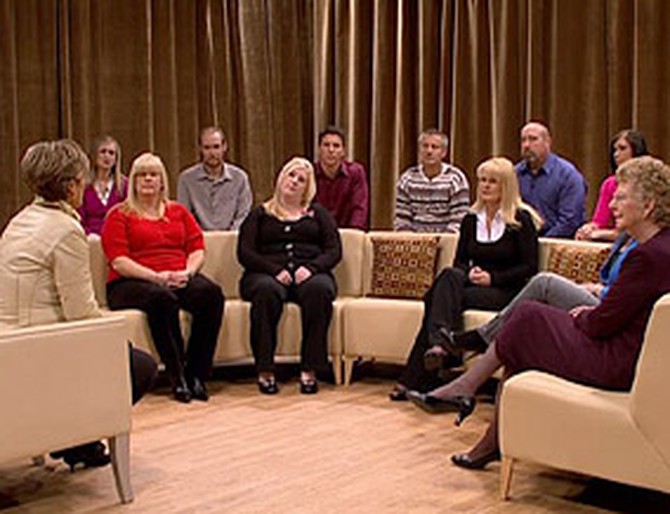
Once she realizes just how dire her financial straits are, Suze says Sylvia has only one option—to turn to family and friends. "You have to ask for help," Suze says. "You actually have to yell it from the mountaintop, 'Help me, because I can't help myself right now.'"
To enlist the help Sylvia needs, Suze gathers a group of loved ones and explains the extent of Sylvia's money problems. Sylvia tells her family she needs someone to babysit her children while she goes on job interviews, as well as some financial assistance until she's back on her feet.
Immediately, Sylvia's sister-in-law Linda and her two nieces, Haley and Heather, offer to watch the kids. "I'm available to help her while she goes out and looks for a job, and I'm also available to help her at least three days out of the week to watch the kids when they get out of school," Linda says. Her aunt Ann Marie offers to pitch in some home-cooked meals, and her sister Cindy and mother, Laura, say they will help in any way they can. "I love you, and you are so strong, much more than you know," Cindy says. "I will help you with anything I know. Whether it's teaching you how to use a computer, you know I'm always there for you."
As for taking care of bills, Suze discourages the family from making loans to Sylvia. "Loans destroy families and friendships because every time you see her, you'll think, 'When is she going to pay me back?'" Suze says. Instead of making a loan, Sylvia's brother-in-law Andy says he will commit to giving her $1,000 per month.
Family members pledge to help her find a new apartment, and her uncle Joe promises to co-sign. Because she won't be able to afford movers, everyone offers to help move her belongings into her new home. "Now I feel like I have wings, like everybody's supporting me," Sylvia says.
Suze says it is important to note that the family members who offered to help Sylvia financially actually could afford to do so. "It's a commitment that they enjoy making that doesn't burden them," Suze says. "Her gift back to all of them is this, that once she is on her feet—and she will be on her feet again, and she will be making money again—when she is in that situation and she sees somebody else in need, she is not going to pay [her family] back. She needs to do that for somebody else who is in her situation when that comes to be."
To enlist the help Sylvia needs, Suze gathers a group of loved ones and explains the extent of Sylvia's money problems. Sylvia tells her family she needs someone to babysit her children while she goes on job interviews, as well as some financial assistance until she's back on her feet.
Immediately, Sylvia's sister-in-law Linda and her two nieces, Haley and Heather, offer to watch the kids. "I'm available to help her while she goes out and looks for a job, and I'm also available to help her at least three days out of the week to watch the kids when they get out of school," Linda says. Her aunt Ann Marie offers to pitch in some home-cooked meals, and her sister Cindy and mother, Laura, say they will help in any way they can. "I love you, and you are so strong, much more than you know," Cindy says. "I will help you with anything I know. Whether it's teaching you how to use a computer, you know I'm always there for you."
As for taking care of bills, Suze discourages the family from making loans to Sylvia. "Loans destroy families and friendships because every time you see her, you'll think, 'When is she going to pay me back?'" Suze says. Instead of making a loan, Sylvia's brother-in-law Andy says he will commit to giving her $1,000 per month.
Family members pledge to help her find a new apartment, and her uncle Joe promises to co-sign. Because she won't be able to afford movers, everyone offers to help move her belongings into her new home. "Now I feel like I have wings, like everybody's supporting me," Sylvia says.
Suze says it is important to note that the family members who offered to help Sylvia financially actually could afford to do so. "It's a commitment that they enjoy making that doesn't burden them," Suze says. "Her gift back to all of them is this, that once she is on her feet—and she will be on her feet again, and she will be making money again—when she is in that situation and she sees somebody else in need, she is not going to pay [her family] back. She needs to do that for somebody else who is in her situation when that comes to be."
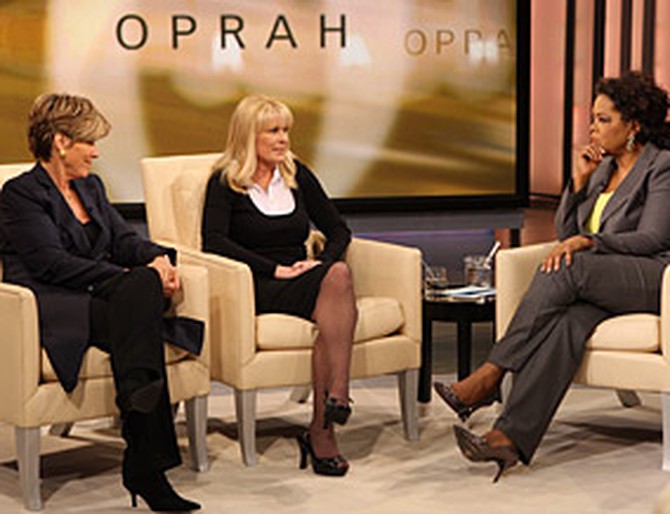
Sylvia's five-bedroom house was overflowing with clothes, knickknacks and toys. So Suze came up with a plan for her to downsize her belongings and make some cash—an emergency estate sale. "That's the quickest way to get rid of things that are valuable," Suze says.
When the sale was over, Sylvia had made a total of $13,000! The money will help to cover the basic necessities for her family. "She needs to put it in a savings account. She needs it for first and last month deposit on an apartment, security deposit, money to buy food for the children, to pay the electricity and keep her life going in that way," Suze says.
In addition to the $13,000 from the sale, $2,000 per month from Social Security and the $1,000 per month from her brother-in-law Andy are helping Sylvia to get on her feet. "She's applying for jobs at haircutting salons. She doesn't care if she has to sweep the floor," Suze says. "She's going to be just fine."
Now that she is on her way to becoming financially stable, Sylvia says she feels like she has her voice back. "Before I felt like I wasn't being myself. I was empty inside," Sylvia says. "The voice is who you are, and you can't change that. I was being changed, but now I'm myself."
Sylvia plans to take her children to counseling in order to help them deal with everything they have gone through. Suze says she hopes the situation will be a learning experience for the kids. "Nothing happens that we can't learn from and benefit from and help change the world with. Hopefully for those children, they will learn to never let themselves get in a situation or a relationship for themselves [like] what they saw for their mother. They can overcome this," Suze says.
"She is strong," Suze says. "She now knows it, but she didn't know it before."
When the sale was over, Sylvia had made a total of $13,000! The money will help to cover the basic necessities for her family. "She needs to put it in a savings account. She needs it for first and last month deposit on an apartment, security deposit, money to buy food for the children, to pay the electricity and keep her life going in that way," Suze says.
In addition to the $13,000 from the sale, $2,000 per month from Social Security and the $1,000 per month from her brother-in-law Andy are helping Sylvia to get on her feet. "She's applying for jobs at haircutting salons. She doesn't care if she has to sweep the floor," Suze says. "She's going to be just fine."
Now that she is on her way to becoming financially stable, Sylvia says she feels like she has her voice back. "Before I felt like I wasn't being myself. I was empty inside," Sylvia says. "The voice is who you are, and you can't change that. I was being changed, but now I'm myself."
Sylvia plans to take her children to counseling in order to help them deal with everything they have gone through. Suze says she hopes the situation will be a learning experience for the kids. "Nothing happens that we can't learn from and benefit from and help change the world with. Hopefully for those children, they will learn to never let themselves get in a situation or a relationship for themselves [like] what they saw for their mother. They can overcome this," Suze says.
"She is strong," Suze says. "She now knows it, but she didn't know it before."
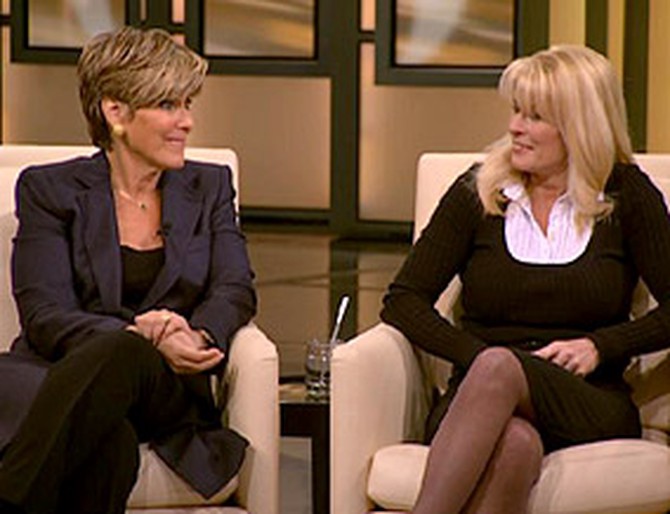
Suze says many women like Sylvia stay in relationships because they can't afford to leave. "So they have to hope that he's still going to save them because they don't know what else to do," Suze says. "Money is so key, because if Sylvia had had money, she would have been out of there. All the women that I talk to that are in battered relationships stay because they don't know what else to do."
Instead of relying on a man for financial stability, Suze says every woman should be able to take care of herself. So Suze created a "save yourself" plan, which she outlines in her book Women & Money .
Even if a woman doesn't have a job, Suze says she can scrape together some money to fall back on. "There's not one of you who has an excuse of not having money. You have $10 here, $20 there," Suze says. "If Sylvia had put $10 a month away for the whole time she was with him, just $10, she would have had $3,000, $4,000, $5,000. That could have been enough for her to leave."
Suze says a woman can create her "save yourself" plan by working on it for just 24 hours a month. "It could be three hours here, five hours here, and you do everything that I say for five consecutive months," Suze says. "I promise you in five months, you will have your 'save yourself' plan in order so what happened to Sylvia, where she had to call on her family and friends, you won't have to do that because you'll be a woman who does own the power to control her destiny."
Instead of relying on a man for financial stability, Suze says every woman should be able to take care of herself. So Suze created a "save yourself" plan, which she outlines in her book Women & Money .
Even if a woman doesn't have a job, Suze says she can scrape together some money to fall back on. "There's not one of you who has an excuse of not having money. You have $10 here, $20 there," Suze says. "If Sylvia had put $10 a month away for the whole time she was with him, just $10, she would have had $3,000, $4,000, $5,000. That could have been enough for her to leave."
Suze says a woman can create her "save yourself" plan by working on it for just 24 hours a month. "It could be three hours here, five hours here, and you do everything that I say for five consecutive months," Suze says. "I promise you in five months, you will have your 'save yourself' plan in order so what happened to Sylvia, where she had to call on her family and friends, you won't have to do that because you'll be a woman who does own the power to control her destiny."

The March 2008 issue of O, The Oprah Magazine features a special section called, "What's Standing Between You and—Ka-ching!—Financial Security."
Some important advice Suze offers in the magazine is on the smart way to rid yourself of credit card debt. "I will always think debt is bondage in its own right, and you'll never have financial freedom if you're in bondage." But Suze says many people who pay off their credit cards make a mistake. "Please do not shut down the credit card itself, because if you shut down the credit card, you actually hurt your FICO score," Suze says. "Just rip up those cards, but don't close down the account."
Another big question discussed in the issue is, "How can I afford to pay for my child's college tuition?" Suze says that isn't the most important thing. "You save for your child's education by teaching them a true education, which is: There's nothing wrong with saving yourself first," Suze says. "If you don't have money, you tell the kids they're going to have to do it on their own. But you are not to sacrifice your lives to pay for a college education for a child."
Some important advice Suze offers in the magazine is on the smart way to rid yourself of credit card debt. "I will always think debt is bondage in its own right, and you'll never have financial freedom if you're in bondage." But Suze says many people who pay off their credit cards make a mistake. "Please do not shut down the credit card itself, because if you shut down the credit card, you actually hurt your FICO score," Suze says. "Just rip up those cards, but don't close down the account."
Another big question discussed in the issue is, "How can I afford to pay for my child's college tuition?" Suze says that isn't the most important thing. "You save for your child's education by teaching them a true education, which is: There's nothing wrong with saving yourself first," Suze says. "If you don't have money, you tell the kids they're going to have to do it on their own. But you are not to sacrifice your lives to pay for a college education for a child."
Published 03/14/2008

